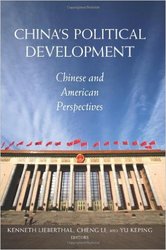More than 35 years after Deng Xiaoping’s ascendancy to power, a sober assessment of the political implications of Deng’s reforms is much needed. China’s Political Development: Chinese and American Perspectives[1] proposes to fill this gap by bringing together the insights of two dozen eminent scholars, twelve each from China and the United States, to address key aspects of governance reform since 1978.
In her thorough review for The China Journal,[2] Dr. Carol Lee Hamrin of the Global China Center describes the book as “a fairly comprehensive and readable account” of governance reform since Deng.
The book is less effective, according to Hamrin, in shedding light on what lies ahead for China, due to several areas in which its treatment of reform and politics in China falls short:
- The use of “political development” and other such concepts suggests progress (ostensibly toward a more democratic China), but evidence presented by the authors points to dysfunction and stagnation on multiple levels. Most of the contributors do not attempt to put China’s reform progress into context through comparison with other political entities in Asia.
- The notion of a Chinese political “system” masks the piecemeal manner in which reform measures have been implemented, as well as the very real factional struggles that continue to plague the Communist Party of China to this day.
- Explanations of central government pronouncements and laws are not sufficiently balanced with analysis of how these measures have actually been carried out. By implying a unified, top-down approach to policymaking, the book does not give sufficient attention to the myriad pressures, both domestic and international, that have influenced policies, nor does it do justice to changes in the functioning of the Party’s own decision-making structures.
These shortcomings, according to Hamrin, hamper the book’s effectiveness in anticipating what is ahead for China. Corruption, factionalism, piecemeal reform efforts, and the lack of progress toward true separation of powers are all mentioned in various chapters, yet their implications for China’s future are not comprehensively developed by the authors.
Hamrin highlights Kenneth Lieberthal’s analysis of two possible approaches to China’s political development—democratic transition versus improving governance. Unfortunately the conditions do not currently exist for either of these to succeed. The Party has neither a powerful master strategist to guide it through a successful political transition, nor does it have the ability to deal with the internal impediments, such as corruption and vested interests, that stand in the way of good governance,
China’s judicial and legislative institutions are weakening, putting greater executive power in the hands of top leaders. Meanwhile, public and elite support for change continues to grow. These two forces are, for Hamrin, like two tectonic plates grinding ever more vigorously against one another, “with potential for catastrophic slippage at an unpredictable time.”

Brent Fulton
Brent Fulton is the founder of ChinaSource. Dr. Fulton served as the first president of ChinaSource until 2019. Prior to his service with ChinaSource, he served from 1995 to 2000 as the managing director of the Institute for Chinese Studies at Wheaton College. From 1987 to 1995 he served as founding …View Full Bio
Are you enjoying a cup of good coffee or fragrant tea while reading the latest ChinaSource post? Consider donating the cost of that “cuppa” to support our content so we can continue to serve you with the latest on Christianity in China.
